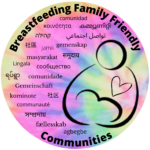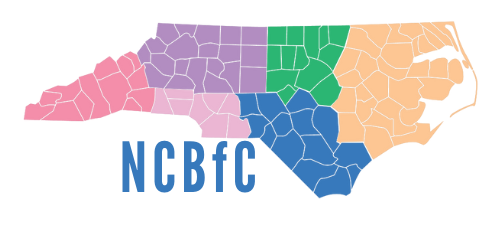At Breastfeeding Family Friendly Communities (BFFC), we often draw inspiration from the innovative approaches of our partners. One particularly compelling story comes from the North Carolina Breastfeeding Coalition (NCBC), which is reimagining how the “Ten Steps to a Breastfeeding Family-Friendly Community” can be applied on a statewide level. Their journey offers valuable insights for communities working to scale breastfeeding support and health equity initiatives.
A Vision for Statewide Impact
While many of us focus on local goals—supporting businesses, engaging healthcare providers, and working with families—NCBC is taking the Ten Steps to new heights by looking at them through a statewide lens. Their vision is ambitious: to create a network of breastfeeding-friendly communities across North Carolina, supported by sustainable systems, culturally competent resources, and dedicated leadership.
This effort requires navigating the complexities of policy, infrastructure, and cultural diversity, all while maintaining a focus on the unique needs of families in rural, urban, and suburban areas.
Step-by-Step: Building Statewide Momentum
Step 1: Community Leadership
NCBC has prioritized fostering leadership at every level, from state officials to grassroots organizers. A key focus is educating county commissioners and policymakers about the importance of breastfeeding-friendly environments. By advocating for statewide policies and securing proclamations, NCBC is embedding breastfeeding support into the public agenda.
Step 2: Welcoming Public Spaces
One of the coalition’s goals is to normalize breastfeeding in public spaces across North Carolina. They are working to expand the use of “Breastfeeding Welcome Here” signage, ensuring that families feel supported whether they’re at a local park, library, or community center.
Step 3: Cultural Competence in Healthcare and Beyond
NCBC recognizes the critical need for cultural competence in breastfeeding support. They’ve identified gaps in healthcare services and are addressing these through peer-to-peer support models, which foster trust and better meet the needs of diverse families.
Step 5: Breastfeeding-Friendly Maternity Care
NCBC is advocating for all maternity care centers in North Carolina to achieve the “Baby-Friendly” designation or an equivalent state-level certification. This effort not only supports families but also ensures that hospitals and clinics are held to consistent standards of breastfeeding education and care.
Step 10: Education and Workforce Development
The coalition is working with healthcare systems, academic institutions, and community colleges to incorporate breastfeeding education into curricula. By preparing the next generation of healthcare and childcare professionals, NCBC is laying the groundwork for a culture of breastfeeding support that will endure for years to come.
Innovative Solutions for Scaling the Ten Steps
One of the most exciting aspects of NCBC’s work is their plan to hire six part-time regional coordinators to provide on-the-ground support across the state. These coordinators will update resource lists, host community meetings, and advocate for systemic changes. It’s a bold move that underscores the coalition’s commitment to creating a sustainable, statewide network of breastfeeding-friendly communities.
In addition to regional coordinators, NCBC is exploring creative funding opportunities, including grant proposals and community-driven fundraising efforts. Their vision also includes an emergency “Oh Shit Fund” to address unexpected needs, ensuring they can respond swiftly to emerging challenges.
Challenges and Opportunities
NCBC’s statewide approach isn’t without its challenges. Engaging businesses to meet breastfeeding family-friendly standards on a large scale is a daunting task; the state requires 21,000 businesses to participate to reach full compliance. Additionally, expanding breastfeeding support to underrepresented groups and faith-based organizations requires ongoing dialogue and culturally appropriate materials.
However, these challenges also present opportunities. By tackling systemic issues and working collaboratively with partners across the state, NCBC is setting a powerful example of how the Ten Steps can be scaled to address both local and statewide needs.
Lessons for Other Communities
For communities looking to take inspiration from NCBC’s work, here are a few takeaways:
- Think Big, Act Locally: Statewide change starts with local action. Engage your community leaders and businesses to build momentum.
- Invest in Leadership: Paid coordinators or dedicated staff can make a significant impact by providing consistent, focused support.
- Collaborate Across Sectors: Partnerships with healthcare providers, businesses, faith-based organizations, and academic institutions are key to creating a holistic support system.
- Focus on Equity: Tailor your efforts to meet the diverse needs of your community, ensuring that no family is left behind.
A Bright Future for North Carolina
NCBC’s work demonstrates that the Ten Steps are more than just a checklist—they’re a framework for systemic change. By applying this framework on a statewide level, NCBC is paving the way for healthier communities, stronger families, and a culture that truly values breastfeeding as a cornerstone of public health.
We’re excited to see how their work unfolds and hope it inspires other communities to think boldly and act collaboratively. Together, we can create a world where every family has the resources and support they need to thrive.

